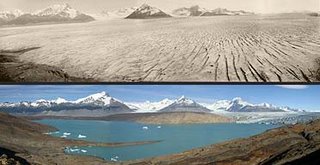Water for millions at risk as glaciers melt away ·
Crisis threatens parts of South America and Asia·
Decline accelerates as global warming takes hold
David Adam, environment correspondent
Wednesday October 11, 2006 The Guardian
The world's glaciers and ice caps are now in terminal decline because of global warming, scientists have discovered. A survey has revealed that the rate of melting across the world has sharply accelerated in recent years, placing even previously stable glaciers in jeopardy. The loss of glaciers in South America and Asia will threaten the water supplies of millions of people within a few decades, the experts warn.
Georg Kaser, a glaciologist at the University of Innsbruck, Austria, who led the research, said: "The glaciers are going to melt and melt until they are all gone. There are not any glaciers getting bigger any more."
Loss of land-based ice is one of the clearest signals of global temperature rise, and the state of glaciers has become a key argument in the debate over climate change. Last year, New Scientist magazine published a letter from the television botanist David Bellamy, a renowned climate sceptic, which claimed that 555 of 625 glaciers measured by the World Glacier Monitoring Service have been growing since 1980. His claim was quickly discredited, but the perception that glaciers are both growing and shrinking remains.
Dr Kaser said that "99.99% of all glaciers" were now shrinking. Increased winter snowfall meant that a few, most notably in New Zealand and Norway, got bigger during the 1990s, he said, but a succession of very warm summers since then had reversed the trend. His team combined different sets of measurements which used stakes and holes drilled into the ice to record the change in mass of more than 300 glaciers since the 1940s. They extrapolated these results to cover thousands of smaller and remote glaciers not directly surveyed.
The results revealed that the world's glaciers and ice caps - defined as all land-based ice except the mighty Greenland and West Antarctic ice sheets - began to shrink far more quickly in 2001. On average, the world's glaciers and ice caps lost enough water between 1961 and 1990 to raise global sea levels by 0.35-0.4 mm each year. For 2001-2004, the figure rose to 0.8-1mm each year.
Writing in the journal Geophysical Research Letters, the scientists say: "Late 20th century glacier wastage is essentially a response to post-1970 global warming." Dr Kaser said: "There is very, very strong evidence that this is down to human-caused changes in the atmosphere."
Emissions of greenhouse gases such as carbon dioxide trap heat in the atmosphere, warming the surface. One of the first impacts of glacier melting is likely to be in South America. In August, a report from 20 UK-based environment and development groups warned that Andean glaciers are melting so fast that some are expected to disappear within 15-25 years.
This would deny major cities water supplies and put populations and food supplies at risk in Colombia, Peru, Chile, Venezuela, Ecuador, Argentina and Bolivia.
Other countries are noticing the effects. Studies show snow and ice cover in the eastern Himalayas has shrunk by about 30% since the 1970s. Melting glaciers have created lakes in the mountains which could burst and cause widespread flooding. Of 150 glaciers that once stood in Glacier National Park in the northern US, only 27 remain. The US Environmental Protection Agency says the biggest are a third the size they were in 1850. Continued warming could melt them completely by 2030.
~~~~~~~~~~~~~~~~~~~~~~~~~~~~
Once again, the Chacaltaya Glacier in Bolivia:
http://www.reisebilder.ch/bolivien/chacafern_e.htm
Collapse of the Perito Moreno Glacier in Argentina
http://www.argentina.org.au/glacier_collapse.htm
And this was over two years ago with melting continuing.
And from NASA:
South American Glaciers Melting Faster
Glaciers Melting At Their Fastest Rate For 5000 Years

Retreating Glaciers Of Patagonia

View from the top ...
Two images of the Upsala glacier in Argentina show the retreat of the ice (top: 1928; bottom: 2004).
Photograph: Greenpeace/Reuters
~~~~~~~~~~~
Water scarcity is simply not just the process of fixing leaky pipes. Although infrastructure is absolutely one of the top concerns and priorities regarding this global crisis, it has been proven that human behavior regarding the burning of fossil fuels is also contributing to the water crisis in our world. Weather patterns particularly regarding rainfall also show in some cases not just a shift in patterns, but a complete reversal, and snows are not coming where they are needed to reverse this melting process.
The effects of these glaciers melting completely will then be past crisis stage if the people who depend on the freshwater provided from them and a rain/snowfall they cannot depend on are left with nothing to use for farming and other needs. Higher elevation farming will only lead to soil erosion and deforestation which in turn will then lead to flooding of crops, and effect the very way of life for thousands of people who without water to survive would then have no choice but to migrate elsewhere.
WE MUST FACE THIS NOW or we will suffer the consequences even more than we already are now, and it will be the poor of this world who will suffer more than any other group.



2 comments:
The water crises are pretty scary. Your blog does a great job of putting it all together. I used to live near L.A., and I do not look forward to the day when 1/3 of the earth is desertified as stated in recent reports. Anyway, good blog.
Thank you. Desertification is a problem growing in other areas as well, such as China. The problem then is where do people go should it become so prevalent that it makes land unlivable? We will have to become more resourceful besides becoming more aware of what our actions are doing and changing them. We are running out of time before that window closes. Thanks again for your response.
Post a Comment